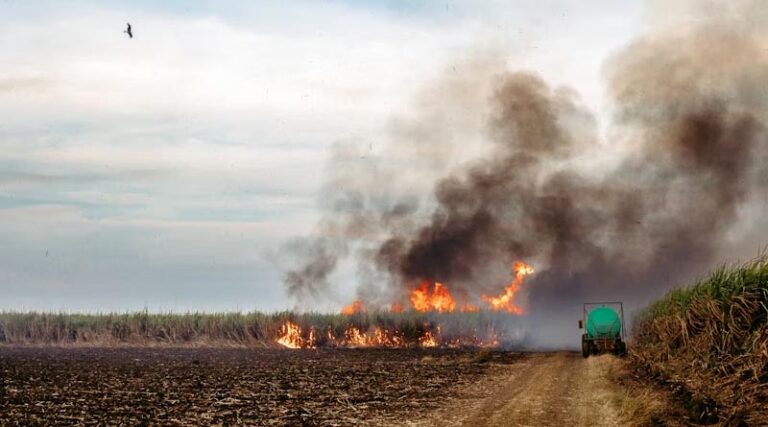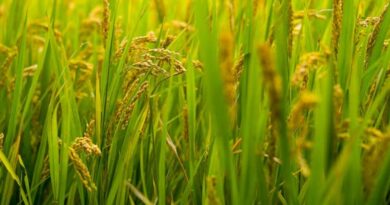
Why Farmers Are Penalised for Stubble Burning While Larger Polluters Go Unchecked
Guest Author: Dr. Pravesh Kumar, Agricultural Scientist
18 November 2025, New Delhi: Newspapers and news reports regularly highlight farmers being jailed and fined for burning stubble. Yet, hardly anyone in the country, apart from farmers, faces such direct punishment for environmental pollution. The same officials who take action against farmers often fail to provide compensation when crops are destroyed by floods, droughts, or other natural causes. But when a farmer burns stubble in his own field, they visit his home at night to impose fines. And the Honorable Supreme Court, which could not send to jail a judge who burned currency notes in his house, orders imprisonment for farmers who burn stubble.
It is the farmers who grow crops and raise livestock, providing the nation with affordable grains, fruits, vegetables, and milk. They protect the environment by planting trees and building ponds. Yet newspapers and news channels rarely highlight that the hard work of farmers in Punjab, Haryana, and Western Uttar Pradesh ensures that people in Delhi get affordable food. These farmers raise animals that provide milk, and the trees they plant help clean Delhi’s air. But the country’s courts have never issued orders to ensure that farmers receive fair wages for their labor. Whenever air pollution rises in Delhi, newspapers and channels quickly blame farmers for stubble burning, and courts also issue punitive directives.
If farmers are to be jailed and fined for polluting the environment, then those who cut down millions of trees every year should also face punishment. Factory owners whose wastewater pollutes rivers, ponds, and lakes, and whose chimneys release toxic smoke, should also be jailed and fined. Those who drive large vehicle convoys should also be penalized because vehicles contribute to air pollution. When no action is taken against such polluters, why should farmers alone be prosecuted?
There is no agricultural residue that inherently needs to be burned. The stubble that farmers burn today was once used as animal fodder. But with animal husbandry becoming less profitable, farmers have reduced the number of animals they keep, decreasing the demand for fodder. As a result, stubble has turned into a residue that must be cleared. Stubble is not just fodder for animals. It is also food for millions of soil microorganisms that make soil fertile. Ideally, stubble should be decomposed in the field.
Technologies such as the Happy Seeder, Super Seeder, Smart Seeder, and various bio decomposers enable in field decomposition. However, these machines are expensive and require high powered tractors, making them inaccessible for most farmers. Due to limited and costly stubble management options, farmers are forced to burn stubble, especially because they get only a few days between harvesting paddy and sowing wheat.
If a crop is damaged by rain or disease, or yields are low, or the farmer does not even recover production costs due to low market prices, then even if stubble management tools exist, he cannot afford them. In such situations, burning becomes the only viable option.
If the government truly wants to end stubble burning, concrete and long term measures are necessary. Just as all products, from liquor to medicines, have a maximum retail price, milk should also have a guaranteed fair price. Animal husbandry should be promoted by enacting a law guaranteeing milk purchase at a fair rate. As animal husbandry increases, farmers will need stubble as fodder, eliminating the need to burn it. With more livestock, farmers will use animal dung and urine in their fields, improving soil fertility and increasing productivity. As soil fertility improves, the need for chemical fertilizers will decrease, reducing production costs. If farmers receive fair prices for milk, get good yields, and face lower input costs, they will naturally avoid burning stubble.
Reduced fertilizer use will also lower the government’s subsidy burden. Increased animal husbandry will raise milk production, ensuring pure milk for citizens. When people consume pure milk, they become healthier, reducing the burden on hospitals. With fewer illnesses, government spending on medicines and healthcare will fall, allowing more funds to be allocated to welfare and development. This will accelerate national progress.
Preventing stubble burning requires ensuring that farmers have access to environmentally friendly and affordable stubble management technologies, such as Happy Seeder, Super Seeder, Smart Seeder, agricultural implements, and bio decomposers, based on their needs. Just as India seeks financial assistance from developed nations to reduce greenhouse gas emissions, the government should support farmers financially for stubble management so they can adopt sustainable alternatives instead of burning residue. The government must also encourage research to develop cheap, practical, and eco friendly methods to decompose stubble in the fields where it is produced, ensuring long term solutions for the future.
📢 If You’re in Agriculture, Make Sure the Right People Hear Your Story.
From product launches to strategic announcements, Global Agriculture offers unmatched visibility across international agri-business markets. Connect with us at pr@global-agriculture.com to explore editorial and advertising opportunities that reach the right audience, worldwide.






